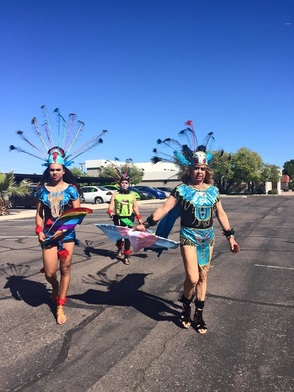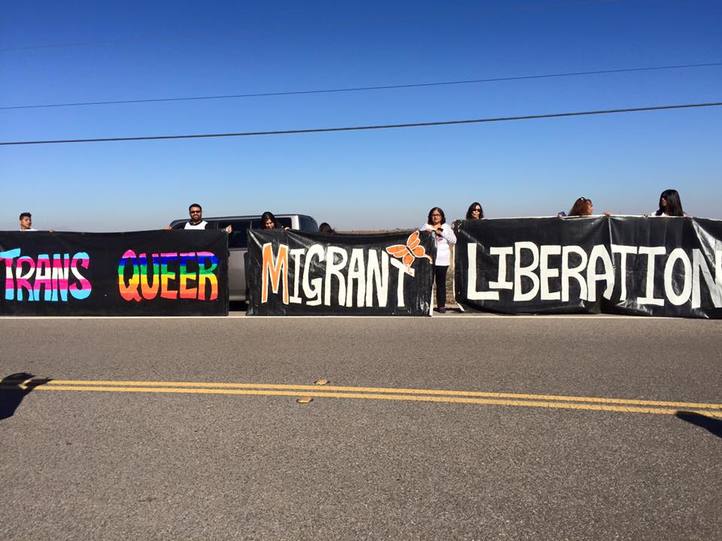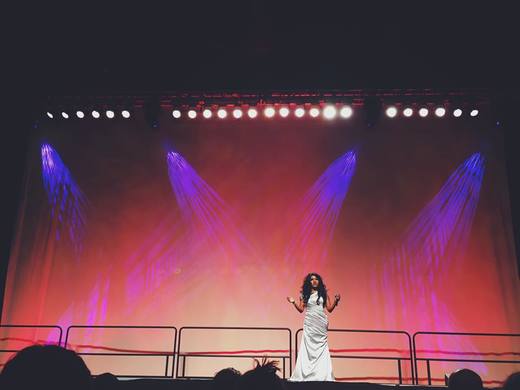|
Can you share a little of your personal story and how it connects to creative/cultural/artistic work? When I was six years old I would put a towel on my head and dance to Gloria Trevi’s “Pelo Suelto.” I felt free and I felt powerful. I migrated to the United States when I was 8 years old. In 2006, I started organizing against Arizona's Proposition 300, which ended my college education as an undocumented student. I came out of the closet and as I moved in queer spaces. I was struck by the power that drag queens hold over their audience. Theater has always been part of my life, and I decided to take on drag performance to organize in a way that was relevant to all of my identities and communities. Once I have the mic, I can say whatever I want. I can talk about themes that are uncomfortable or ignored. Drag is an art form that lets my face be my canvass and my body create my message. When we hold Queer ARTivismo events, we open up space for others to take on this challenge in their own unique ways, to find that place of expression where identity and justice meet. Note: Proposition 300 is a referendum approved by Arizona voters in November 2006. Proposition 300 provides that university students who are not U.S. citizens or permanent residents, or who do not have lawful immigration status, are not eligible for in-state tuition status or financial aid that is funded or subsidized by state monies. What is Trans Queer Pueblo, and what is on the horizon for your work? Trans Queer Pueblo is an LGBTQ+ migrant community organization. We work to create cycles of mutual support and cultivate leadership to generate community power toward social justice. We are just incorporating this year, after 5 years of work and we will be cementing our work toward migrant family acceptance, economic justice, access to health for LGBTQ+ migrant community and community defense against criminalization. We are excited to be working toward a home for our QTPOC family here in Phoenix, which means that we’re launching a fundraising campaign and planning gardens.  What themes or topics do you address in your artistic and cultural work? The work of Trans Queer Pueblo is focused on building the power of LGBTQ+Migrant and PoC communities toward social justice. Within TQPueblo we work on Health Justice, Family Acceptance, Community Defense and Economic Justice. To keep all of this heavy work going, it is essential to have creative space to nurture those doing the work and to welcome in the broader community around them. We find that our political work has to have a cultural home and our contribution to that is our Queer ARTivismo space. At the ARTivismo events there are few rules: community members are invited to show off or try out different art forms. We create a fun and relaxed space that is centered on queer and trans people of color where they can address the joy, sorrow, hope and anger in their lives as they see fit. Why is artistic and creative expression important to social justice organizing and movements? Our movement is a product of our culture and a tool to work on our culture is art. If we use art to create a culture that is independent, rooted, and liberated, that culture will bring more people and perspectives to the movement and nurture those people as they do the work of building social justice. Our culture must provide a home in which our resistance can live. Creative expression allows people to engage in a different way. It allows the public to connect with what is going on in a more personal way. Art and creative expression allow us to learn across experiences and are an important tool to bring communities together. What is special or uniquely powerful about Arizona artists and aesthetics? Arizona aesthetics and artists are uniquely powerful because they are driven by day-to-day experiences in "ground zero" of anti-LGBTQ+ and Migrant realities. The aesthetics and perspectives that come out of Arizona challenge the norms and push the boundaries.
1 Comment
|
Banner photo by:
Carlos Antonio
|



 RSS Feed
RSS Feed